|
|
|
Sort Order |
|
|
|
Items / Page
|
|
|
|
|
|
|
| Srl | Item |
| 1 |
ID:
181187
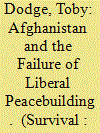

|
|
|
|
|
| Summary/Abstract |
The collapse of the US-aligned Afghan government and the seizure of Kabul by the Taliban in 2021 as the United States withdrew its forces was ultimately caused by a change in US government policy in June 2003. At that point, the George W. Bush administration dropped its aversion to state-building and its plan for a limited intervention designed to rid the country of al-Qaeda and the Taliban. The US instead undertook an extended exercise in liberal peacebuilding, involving the creation of an institutionally and coercively powerful centralised Afghan state and a liberal-democratic system. This enterprise was inherently misconceived, largely ignoring Afghan history and culture, as well as the limitations of the US and its partners. The painful experience of the past 18 years indicates that liberal peacebuilding, at least along the lines of the US-led effort in Afghanistan, should not be attempted again.
|
|
|
|
|
|
|
|
|
|
|
|
|
|
|
|
| 2 |
ID:
181188
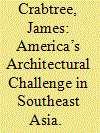

|
|
|
|
|
| Summary/Abstract |
US Vice President Kamala Harris and Secretary of Defense Lloyd J. Austin III have made significant official visits to Southeast Asia. Both sought to address concerns that the US had paid insufficient attention to the region during President Joe Biden's early months in office. But they left unanswered substantial questions about future US strategy as to both the Asia-Pacific as a whole and Southeast Asia in particular. This underlined doubts about Washington's ability to create and develop the kind of regional initiatives, institutions and partnerships that might help to blunt China's rise and draw nations in Southeast Asia back towards the US. To do so, the US will have to marshal deep focus and subtle statecraft to create new diplomatic architecture and set new standards for the region in areas such as trade and new technologies. Otherwise, American influence in the region is likely to decline.
|
|
|
|
|
|
|
|
|
|
|
|
|
|
|
|
| 3 |
ID:
181191
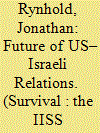

|
|
|
|
|
| Summary/Abstract |
The special relationship between the United States and Israel has been built on three pillars: shared strategic interests, the resonance of Israel in American political culture and the influence of the pro-Israel lobby. While the strategic pillar has been the most controversial, as many in Washington have viewed Israel as a strategic liability, the dramatic improvement in relations between Israel and America’s Gulf Arab partners has diminished this concern. But the once strong cultural and domestic political pillars are now under strain. In the wake of a sharp decline in sympathy for Israel within the Democratic Party, bipartisan support for Israel is now in doubt. The new Israeli government has the potential to arrest and reverse this decline. Without progress towards a two-state solution to the Israeli–Palestinian conflict, however, the challenge will remain.
|
|
|
|
|
|
|
|
|
|
|
|
|
|
|
|
| 4 |
ID:
181189
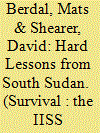

|
|
|
|
|
| Summary/Abstract |
South Sudan's tragic history of independent statehood raises important questions about the future of the United Nations Mission in South Sudan (UNMISS). UNMISS cannot bring peace to the country on its own. For that to happen, South Sudan's militarised form of governance and political economy must be transformed. Recognising UNMISS's limitations does not, however, preclude a vital and continuing role for the mission. UNMISS must work to reduce alarming levels of local and sub-national violence and help shore up the fragile peace agreement reached between Salva Kiir and Riek Machar in 2018. The mission must also manage the risks of further instability posed by poorly managed security-sector reform and elections scheduled for 2022. Finally, UNMISS and the UN must intensify the search for political avenues out of violence. To this end, renewed and constructive international engagement must be marshalled, and the UN must absorb important lessons from its own performance.
|
|
|
|
|
|
|
|
|
|
|
|
|
|
|
|
| 5 |
ID:
181193
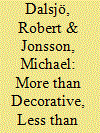

|
|
|
|
|
| Summary/Abstract |
Following the Russian occupation and annexation of Crimea, Western assessments of Russia’s military capabilities rapidly changed from ‘basket case’ to ‘menace’. In this pendulum swing, some estimates clearly overshot, especially concerning Russian anti-access/area-denial (A2/AD) capabilities. These were described as creating large no-go zones on NATO’s eastern flank that could be overcome only at high risk or with new, exotic and costly kit. This impression could reinforce perceptions that the eastern allies could not be defended. This article argues that technical limitations, a wide range of possible countermeasures and experiences from air operations in Syria, Libya and Nagorno-Karabakh together suggest a less alarmist assessment of Russian A2/AD capabilities. But the threat should not be underestimated, and expanded NATO area-access assets are needed, as Russia will continuously improve its capabilities and the status quo is fluid.
|
|
|
|
|
|
|
|
|
|
|
|
|
|
|
|
| 6 |
ID:
181192
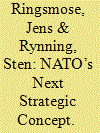

|
|
|
|
|
| Summary/Abstract |
NATO has embarked on the renewal of its Strategic Concept, the latest version of which dates to 2010. The question is whether this opportunity for renewal will result in a broad and elastic set of core tasks that have wide political appeal but that are ill suited to meet NATO’s strategic challenges. The Alliance opted for political convenience in 2010, and since then the complexity of Alliance politics has only increased. Allowing political considerations to dictate the contents of the new Strategic Concept would, however, bode ill for NATO’s ability to manage not only great-power competition but also an internal political–military divide that has become increasingly visible as NATO has adapted to Russia’s post-2014 revisionism. NATO’s next Strategic Concept should therefore put collective defence at the top of its list of priorities, reinvigorate NATO’s narrative of values, and encourage enhanced and sustained in-house political–military dialogue.
|
|
|
|
|
|
|
|
|
|
|
|
|
|
|
|
| 7 |
ID:
181186
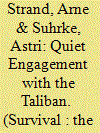

|
|
|
|
|
| Summary/Abstract |
The international response to the Taliban's sudden assumption of power in Kabul will make a critical difference for future developments in the country. Among the range of choices, a strong case can be made for engagement, dialogue and assistance. Immediate humanitarian need and widespread extreme poverty warrant substantial aid, including funds to maintain basic programmes established over the past two decades in health and education. The experience of international organisations working in Afghanistan during Taliban rule in the late 1990s constitutes a constructive precedent. Cooperation over aid is also an opening for a dialogue in which wider concerns can be aired. As in the late 1990s, sanctions and international isolation are likely to prove counterproductive by harming the Afghan people and strengthening the hardline factions of the Taliban.
|
|
|
|
|
|
|
|
|
|
|
|
|
|
|
|
| 8 |
ID:
181194
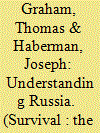

|
|
|
|
|
| Summary/Abstract |
In Weak Strongman: The Limits of Power in Putin’s Russia, Timothy Frye provides an invaluable antidote to the Western preoccupation with the Russian president. Vladimir Putin, he convincingly argues, operates in a political context that constrains his options as he seeks to maintain indispensable elite support and avoid destabilising popular discontent. Understanding that context is critical, and Frye contends that the best way to do so is to look at other so-called ‘personalist autocracies’, such as Viktor Orbán’s Hungary, Recep Tayyip Erdogan’s Turkey or Nicolás Maduro’s Venezuela. But Frye overstates his case and errs in dismissing the role Russia’s unique history, geography and culture have played in shaping Russian behaviour and Putin’s choices. Indeed, Putin operates within a political tradition whose core features have endured for centuries across multiple regimes. Contrary to Frye, understanding the historical continuity of the Kremlin’s strategic calculus is essential to making sense of Russia today.
|
|
|
|
|
|
|
|
|
|
|
|
|
|
|
|
| 9 |
ID:
181190
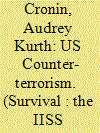

|
|
|
|
|
| Summary/Abstract |
What should the future of US counter-terrorism policy be? This article reviews American strategic successes and mistakes of the past 20 years, including the wars in Iraq and Afghanistan. Drifting objectives, public intolerance of risk and a misguided counter-insurgency approach to counter-terrorism all yielded an undifferentiated global campaign of attrition that the United States could never win. As the years passed, tactics eclipsed strategic thinking altogether. Meanwhile, the impact of digital technology, a resurgent right-wing threat and rising major powers such as Russia and China altered the global context and required new thinking. The only way the United States can respond effectively, especially after the calamitous and credibility-sapping withdrawal from Afghanistan, is to build stronger links with capable allies and partners, and to reframe its approach. The future of US counter-terrorism demands moving beyond a symmetrical US global counter-insurgency approach and adopting a selective, asymmetrical strategy of strongpoint defence.
|
|
|
|
|
|
|
|
|
|
|
|
|
|
|
|
| 10 |
ID:
181195


|
|
|
|
|
| Summary/Abstract |
The US military has developed a persistent ‘German problem' due to the outsize influence of legendary strategist John Boyd. In a cautionary tale of how poor military history can lead to real-world mistakes, Stephen Robinson, in his book The Blind Strategist, demonstrates that, by basing his ideas on the tendentious work of historian B.H. Liddell Hart in collaboration with a coterie of former Wehrmacht officers, Boyd ingrained in the US military a culture of strategic thinking focused on achieving tactical and operational success through ‘manoeuvre warfare' at the expense of a coherent war-winning strategy. Although Robinson overstates his case in certain areas, he convincingly demonstrates that Boyd’s thinking continues to affect the US military in ways that could prove damaging in future wars, particularly against peer adversaries.
|
|
|
|
|
|
|
|
|
|
|
|
|
|
|
|
| 11 |
ID:
181185


|
|
|
|
|
| Summary/Abstract |
Liberal internationalists, such as professors Daniel Deudney and G. John Ikenberry, share much of the neoconservatives’ international agenda while disagreeing with them on domestic policies. Likewise, the members of what they call the ‘Quincy coalition’ agree on opposing US interventionism and military domination without necessarily agreeing on other issues. Those at the Quincy Institute for Responsible Statecraft are internationalists in that we believe firmly in international cooperation in pursuit of essential common goals, such as limiting climate change. We also believe, however, that pursuing these goals through US domination hinders rather than advances their achievement. Liberal internationalism as envisaged by Deudney and Ikenberry is intrinsically linked to US hegemony and one form of American ideological nationalism. They share responsibility for the disasters that these have caused, and for the growing confrontation with China that threatens to wreck prospects for a peaceful and consensual global order.
|
|
|
|
|
|
|
|
|
|
|
|
|
|
|
|
|
|
|
|
|